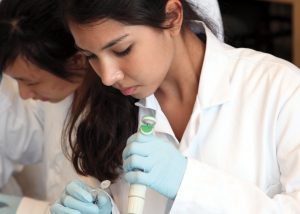Clinical Experience
 BE 400: Clinical Preceptorship in Bioengineering
BE 400: Clinical Preceptorship in Bioengineering
In the course “Clinical Preceptorship in Bioengineering” (BE 400), students receive what few undergraduates in the United States ever have the opportunity to experience: a chance to shadow renowned physicians for 10 weeks as they treat patients, perform surgeries, and diagnose disease.
Directed by Dr. David Eckmann, this course introduces students to real-life problems in medicine through lectures and a “clinical preceptorship,” which is an intensive experience under the direction of a faculty mentor. In this preceptorship, students spend about 10 to 15 hours per week in the clinic for 10 weeks. During this time, they can watch procedures, sit in on case discussions, talk with medical residents, follow clinicians, and work on a clinical research project.
Student comments from this course:
“BE 400 was likely the most influential course I enrolled in during my undergraduate time at Penn. The course is valuable as part of the bioengineering degree because it gives students an appreciation for the biomedical devices and technologies used in hospitals and clinics. Involvement in a project during the preceptorship gives students the opportunity to finally test out what they’ve learned in their other bioengineering courses – to see their problem-solving skills in practice, solving real medical problems. The course allows students to form lasting relationships with mentors and to possibly have their first experience observing doctors or taking part in research.
“My preceptor for BE400 eventually became my long-term mentor, and I have continued to work with him for the past 4 years while attending medical school at Penn. My relationship with my mentor has led to various additional research projects with opportunities to publish and present our work at national conferences. Ultimately, my experiences in my mentor’s field have been unparalleled (even after various rotations as a medical student) and I look forward to applying to residency within his field.
Simply put, the experiences we have are what shape us into who we are, and BE 400 is an invaluable experience unlike any other at the bioengineering undergraduate level.” -Ryan Carey, Perelman School of Medicine, MD Candidate 2017
“I recommend BE 400, the Clinical Preceptorship, to all bioengineeirng students and others who are interested in both engineering and medicine. In the first part of the course, through a series of guest lectures from professors who are the leaders in their fields, I learned not only about the state-of -the-art research, but also about how engineering helps to advance the field of medicine. In the second part of the course, I had the privilege to shadow and work with a neuroanesthesiologist at the Hospital of the University of Pennsylvania. Through my preceptor, I gained hands-on experience in research in medical device, and learned many challenges in medicine that can be addressed through bioengineering. As an undergraduate student, I cannot always make the connections between tangible impacts in real life and what I am learning in class or even what I do in my research lab. BE 400 has provided me with a platform to see how bioengineering can help to improve both medical staffs’ and patients’ quality of life, which has helped me to decide the future path I want to take and motivated me to be a life-long self-directed learner.” –Chang Su, Class of 2016
“BE 400 was one of the most valuable and illuminating courses I took at Penn. Each aspect of the course has a clear and crucial role in enhancing a budding bioengineer’s knowledge and skill set. In addition to introducing us with the preceptors we could work with for the latter half of the course, the lectures at the course’s beginning lucidly demonstrated how the more theoretical principles we had learned during our earlier years at Penn apply in a clinical setting. Each of us also had the rewarding opportunity of working closely with a preceptor who applied bioengineering principles in his or her daily life; my preceptorship partner and I used the fundamentals we had learned in previous courses to complete a research project that profoundly impacted the practice of medicine. A very well-designed course and one I would enthusiastically recommend!” –Moez Aziz, Class of 2015
Undergraduate Program:
BE Advising Contact:
Ms. Kacy M. Dadura
Associate Director for Advising
Room 240 Skirkanich Hall
